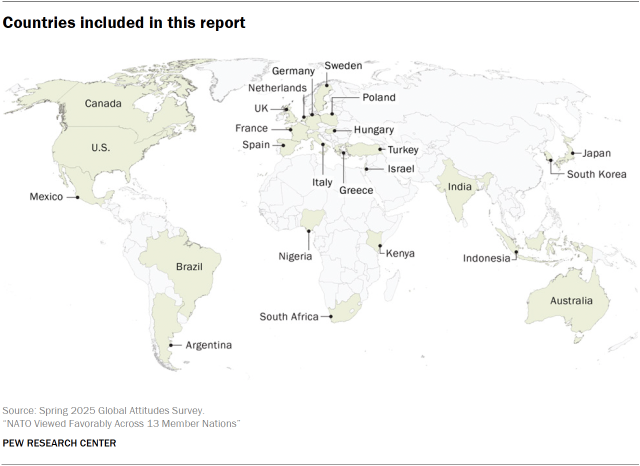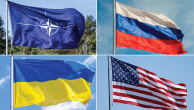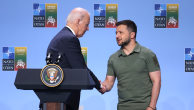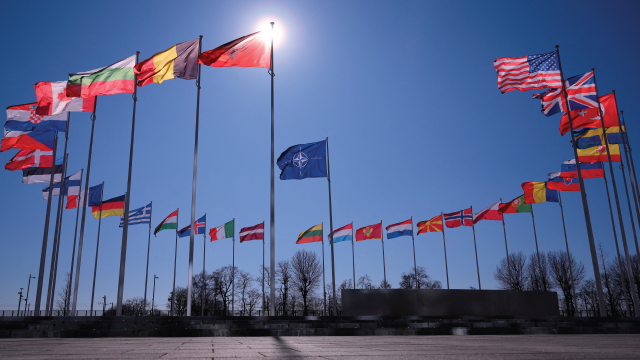
Ahead of this month’s NATO summit in the Netherlands, people in 13 surveyed member nations continue to view the alliance in a mostly favorable light.
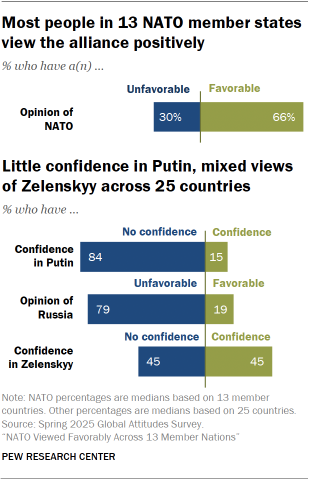
Meanwhile, roughly three years after Russia’s military invasion of Ukraine, international opinion of Russian President Vladimir Putin and the country he leads remains negative across a broader set of 25 countries. A median of 84% of adults lack confidence in Putin to do the right thing regarding world affairs, and a median of 79% have an unfavorable view of Russia.
Confidence in Ukrainian President Volodymyr Zelenskyy is mixed overall, although his ratings have increased in several European nations allied with Ukraine.
These findings are based on a survey of 31,938 adults in 25 countries conducted Jan. 8-April 26, 2025, before the Ukrainian drone attacks against Russia and the latest round of peace talks between the two countries.
Views of NATO
NATO is seen more favorably than not across most of the 13 member countries included in the survey: A median of 66% of adults have a positive view of the alliance. Opinions vary widely, however, from 81% favorability in Poland to 28% in Greece.
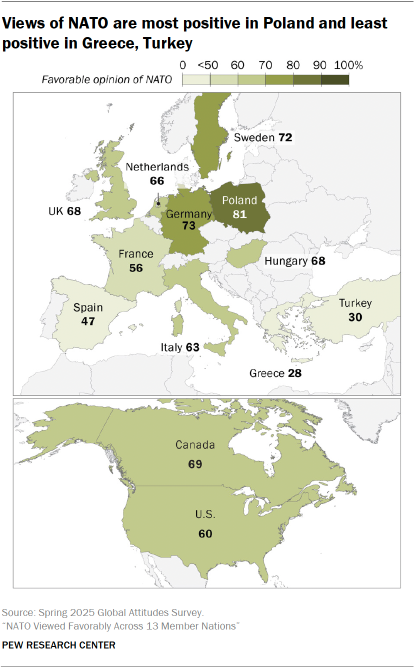
Favorable views of NATO have declined since 2024 in a few countries, including Turkey and Greece, where the organization is historically less well-regarded than it is in other member nations. However, positive views of NATO are up since last year in Canada and Germany.
Opinions of NATO are divided along ideological lines. In four member nations surveyed – Canada, Hungary, the United Kingdom and the United States – people who place themselves on the ideological left are more likely than those on the right to see NATO favorably. In Greece and Sweden, by contrast, the organization gets higher ratings from the right than the left.
Views of Putin and Russia
Confidence in Putin
Across the broader set of 25 countries, few people express confidence in Putin’s leadership on the world stage. A median of 15% have confidence in him to do the right thing regarding world affairs, while a median of 84% do not.
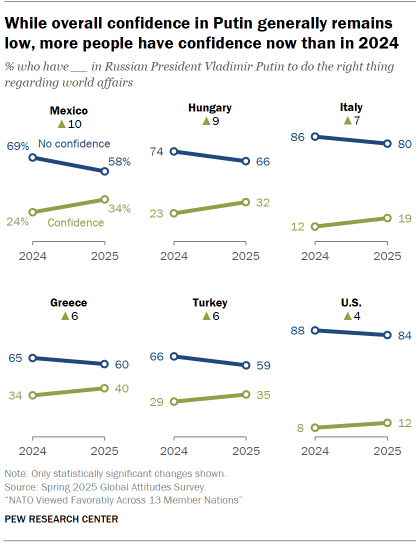
Confidence in Putin has remained low since Russia’s February 2022 invasion of Ukraine. But views of Putin have become more favorable in a handful of countries since 2024. Confidence in the Russian president is up in Greece, Hungary, Italy, Mexico, Turkey and the U.S. In the U.S., this movement has come largely among Republicans and Republican-leaning independents. Still, only 17% of Republicans have confidence in Putin.
Related: Republican Opinion Shifts on Russia-Ukraine War
People who place themselves on the ideological right have become more confident in Putin in six countries since last year: Nigeria (+15 percentage points), Italy (+13), Mexico (+11), Hungary (+10), Brazil (+9), and the U.S. (+6).
In many countries, confidence in Putin is related to confidence in U.S. President Donald Trump. In Australia, Canada and most of the European countries surveyed, people who have confidence in Trump are also more likely to have confidence in Putin.
Favorability of Russia
Russia continues to be seen in a mostly negative light by people in the 25 countries surveyed. A median of 19% have a favorable view of Russia, while a median of 79% have an unfavorable view. In two countries – India and Indonesia – views of Russia are more favorable than not. And in Nigeria and Mexico, opinions are mixed.
While overall favorability of Russia remains low, an increasing share of the public in five
countries – Greece, Hungary, Italy and Turkey – have a positive view of the country.
Greeks and Italians, for example, are 10 points more likely to have a favorable opinion of Russia this year than in 2024. And in Hungary and Italy, views have become especially more positive among people on the ideological right and those who support their nation’s right-wing populist parties.
People across most of the countries surveyed see the U.S. more favorably than Russia, even as positive opinion of the U.S. has dropped over the past year. However, adults in Indonesia, Mexico and Turkey express more favorable views of Russia than of the U.S.
For more on U.S. image abroad, read our recent report, “U.S. Image Declines in Many Nations Amid Low Confidence in Trump.”
Views of Zelenskyy
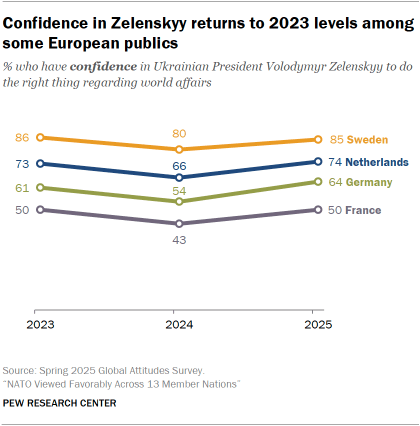
Confidence in Zelenskyy is mixed across the 25 nations surveyed: A median of 45% have confidence in him to do the right thing regarding world affairs, while an identical median share do not. The survey was conducted before Ukraine’s drone attacks against Russian targets.
While confidence in Zelenskyy dipped in some countries between 2023 and 2024, it has increased in some of the same places over the past year. For example, 64% of Germans have confidence in Zelenskyy today, up from 54% in 2024 and closer to the level of support measured in 2023 (61%).
In many European countries, supporters of right-wing populist parties are less likely than nonsupporters to express confidence in Zelenskyy. And, as is the case with international views of Putin, confidence in Zelenskyy is related to confidence in the U.S. president. Across most of the 25 countries surveyed, people with confidence in Trump are less likely to express confidence in Zelenskyy.
In 15 of the 25 countries surveyed – including NATO member nations Canada, France, Germany, Sweden and the U.S. – people have more confidence in Zelenskyy than in Putin. However, in eight countries, including Greece and Hungary, people express more confidence in Putin than in Zelenskyy. In Argentina and Kenya, confidence in the two leaders is similar.
Country spotlight: Hungary
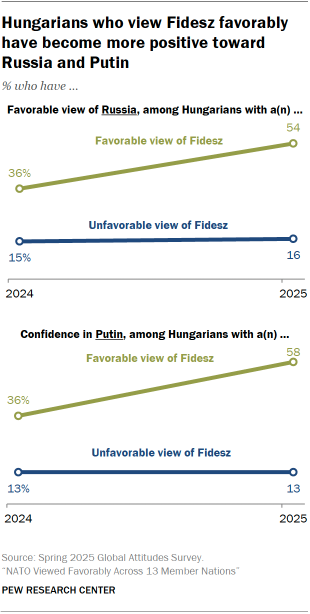
Here are key takeaways from Hungary, where ratings for Putin and Russia have improved somewhat over the past year:
- Hungarians on the ideological right have become more confident in Putin and more favorable toward Russia since 2024, as have those with a favorable view of Fidesz (the right-wing populist party of Prime Minister Viktor Orbán).
- Overall confidence in Zelenskyy has also risen somewhat, from 17% in 2024 to 23% today. While support for both Putin and Zelenskyy is low among Hungarians, more have confidence in Putin than in the Ukrainian president (32% vs. 23%).
- 68% of Hungarians have a favorable view of NATO, largely unchanged from 67% in 2024.
Country spotlight: Turkey
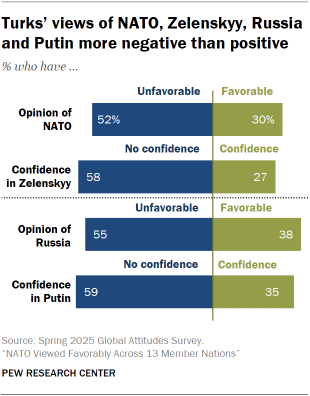
Here are key takeaways from Turkey, which has hosted peace talks between Russia and Ukraine:
- 30% of Turks have a favorable opinion of NATO. The highest this share has ever been in our surveys is 42%, measured in 2024.
- 27% of Turks have confidence in Zelenskyy, around the same share as in 2024. A somewhat larger share (35%) have confidence in Putin.
- Though fewer than four-in-ten Turks see Putin or Russia in a positive light, there have been modest increases in confidence in the Russian leader (+6 points) and favorability of Russia (+8) since 2024.
Country spotlight: United States
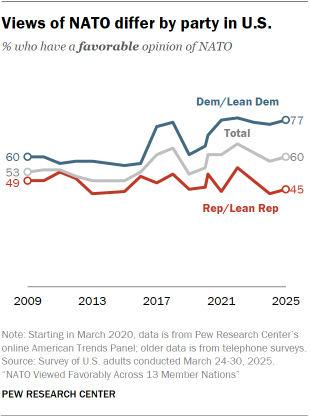
Here are key takeaways from the U.S., where Democrats are more likely than Republicans to see the NATO alliance favorably:
- Six-in-ten Americans have a favorable view of NATO, though that share is much higher among Democrats than Republicans (77% vs. 45%).
- Similarly low shares in the U.S. are confident in Putin (12%) or view Russia favorably (13%). There has been a slight uptick in the share of Americans who express confidence in Putin over the past year (+4 points).
- About half of Americans have confidence in Zelenskyy, down from a high of 56% in March 2023.
For more on U.S. views of the Russia-Ukraine war, read “Republican Opinion Shifts on Russia-Ukraine War.”
CORRECTION (June 23, 2025): A previous version of this report referred to Viktor Orbán as Hungary’s president instead of prime minister. This has been updated.
